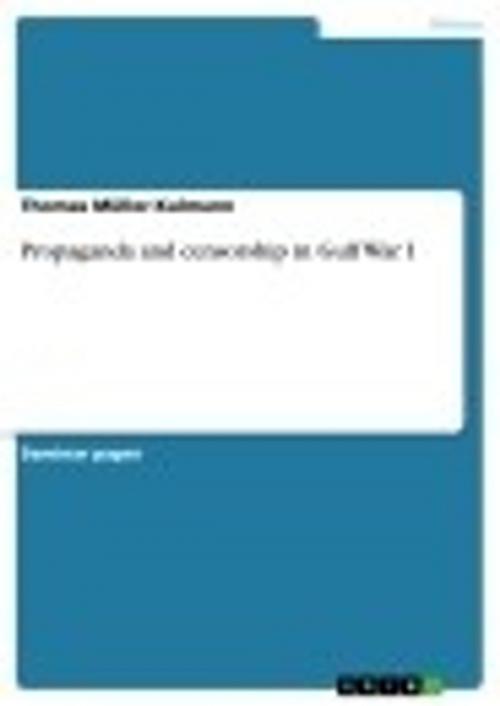| Author: | Thomas Müller-Kulmann | ISBN: | 9783638191524 |
| Publisher: | GRIN Publishing | Publication: | May 14, 2003 |
| Imprint: | GRIN Publishing | Language: | English |
| Author: | Thomas Müller-Kulmann |
| ISBN: | 9783638191524 |
| Publisher: | GRIN Publishing |
| Publication: | May 14, 2003 |
| Imprint: | GRIN Publishing |
| Language: | English |
Seminar paper from the year 2003 in the subject History - America, grade: 1,0 (A), University of Cologne (History Seminar/Anglo-American History), course: Promoting War: Media and War in American History, 7 entries in the bibliography, language: English, abstract: 'The Bush Administration achieved a five-month-long commercial for militarism and individual weapon systems. The American people were seduced into the celebration of a slaughter by controlled propaganda demonizing Iraq, assuring the world no harm would come to Iraqi civilians, deliberately spreading false stories of atrocities including chemical warfare threats, deaths of incubator babies and threats to the entire region by a new Hitler' (Initial Complaint of the International War Crimes Tribunal)1 The Persian Gulf War in 1991 is considered to be one of the most strongly censored wars in American history. Besides security reasons, the censorship policy was also intended to raise and sustain support for the American troops on the home front in order to avoid 'mistakes' in the handling of the media, that supposedly lead to the defeat in the Vietnam War. Besides the restrictions for free media reporting inflicted by the government, the media was one of the strongest censors themselves. This paper deals with the censorship system that was used by the US military and the media's self-imposed censorship. It addresses the question to what extent the system exceeded the intended security purpose and how the media reacted to those restrictions. Propaganda strategies used before and during the war are also being examined. Besides, emphasis is put on the media's role as an independent institution and its performance to provide the American people with unbiased and relevant information.
Seminar paper from the year 2003 in the subject History - America, grade: 1,0 (A), University of Cologne (History Seminar/Anglo-American History), course: Promoting War: Media and War in American History, 7 entries in the bibliography, language: English, abstract: 'The Bush Administration achieved a five-month-long commercial for militarism and individual weapon systems. The American people were seduced into the celebration of a slaughter by controlled propaganda demonizing Iraq, assuring the world no harm would come to Iraqi civilians, deliberately spreading false stories of atrocities including chemical warfare threats, deaths of incubator babies and threats to the entire region by a new Hitler' (Initial Complaint of the International War Crimes Tribunal)1 The Persian Gulf War in 1991 is considered to be one of the most strongly censored wars in American history. Besides security reasons, the censorship policy was also intended to raise and sustain support for the American troops on the home front in order to avoid 'mistakes' in the handling of the media, that supposedly lead to the defeat in the Vietnam War. Besides the restrictions for free media reporting inflicted by the government, the media was one of the strongest censors themselves. This paper deals with the censorship system that was used by the US military and the media's self-imposed censorship. It addresses the question to what extent the system exceeded the intended security purpose and how the media reacted to those restrictions. Propaganda strategies used before and during the war are also being examined. Besides, emphasis is put on the media's role as an independent institution and its performance to provide the American people with unbiased and relevant information.















